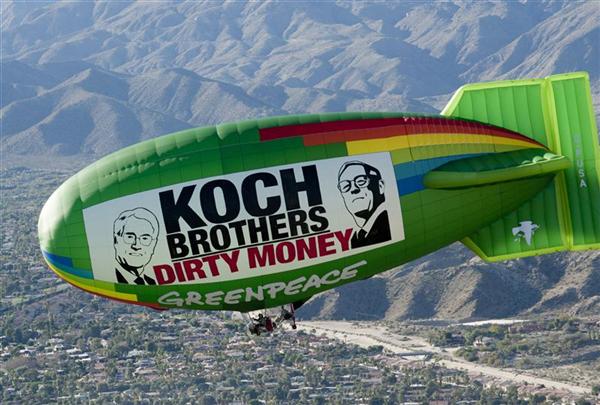The Yes on 23 campaign raised $10.6 million over ninety two percent of which came from petroleum and energy companies, including over $4 million from Valero Energy, $1.5 million from Tesoro Corporation and $1 million from Koch Industries subsidiary Flint Hills Resources.
Koch Industries also supported the Proposition through industry front groups, including the California chapter of Americans for Prosperity, which advertised heavily to support Prop 23, and the Pacific Research Institute, which published and circulated flawed economic studies of California’s climate and energy legislation. Proposition 23 garnered national media attention and was defeated in the November, 2010 election by a grassroots voter education effort across the state.
Full Scoop:
Known as the Global Warming Solutions Act or AB 32, California’s climate and energy bill was signed into law in 2006. The main provisions of AB 32 include an incremental roadmap to reduceCalifornia’s greenhouse gas emissions to 1990 levels by 2020 and implementation of a 33%renewable energy standard. The economic benefits of AB 32 have been repeatedly documented.
On September 20, 2010, Koch Industries’ wholly-owned subsidiary, Flint Hills Resources, gave one million dollars to the Yes on 23 campaign. Passage of Proposition 23 would have stalled the application of the Global Warming Solutions Act until state unemployment dropped to 5.5% and remained so for a full year, a level only achieved three times over the last forty years.
Koch Industries supplemented their effort to promote Proposition 23 with a $10,000 contribution to California Republican Senate candidate Carly Fiorina, while $9,600 in additional campaign funding was donated directly to Fiorina from the Kochs and their wives. Fiorina endorsed the Prop 23 campaign in early September, but lost her election campaign against Democratic incumbent Barbara Boxer.
As attention was drawn to the money Koch Industries spent on Proposition 23, it became clear that the conglomerate was supporting Prop 23 through other outlets as well. The Kochs relied on cogs in the climate denial machine they fund to broadcast a false association between AB 32 and the state’s economic troubles.
The California chapter of a Koch-founded and -financed astroturf group, Americans for Prosperity (AFP), made passing Prop 23 their “highest priority. AFP ran promotional ads and held a “No Jobs Fair” at a Republican National Committee rally to support the Proposition.
A second industry front group took a different approach. The San Francisco-based Pacific Research Institute for Public Policy (PRI), which has received over $1.2 million from the Kochs since 1997and hundreds of thousands of dollars from ExxonMobil, was at the forefront of attacks on California’s climate and energy law.
PRI recycled a widely debunked “Spanish Study” (an attack on the renewable energy industry) in order to slander California’s efforts to create more clean energy jobs. PRI promoted another study that drew widespread criticism: “The Cost of AB32 on California Small Businesses,” written by Sanjay B. Varshney and Dennis H. Tootelian. Other Koch-funded groups, including the Heritage Foundation and the California chapter of Americans for Prosperity touted both the discredited both ‘The Cost of AB32″ report and its data.
One month before the November elections, PRI published its own report, authored by in-house economist Benjamin Zycher, who has ties to other Koch-funded groups including the Manhattan Institute and the Cato Institute. Zycher’s report was paid for by the oil-financed Yes on 23campaign through a $40,000 research grant. Zycher denied knowledge of the report’s funding and challenged his critics to “point to an error in the paper.” Although errors in methodology have been publicly presented, neither Zycher nor PRI has addressed them. The Zycher study was also disseminated by the Koch-backed Reason Foundation, based in Los Angeles.
Koch Industries’ motivation to attack AB 32 can be traced deeper than the precedent California is setting by reducing global warming pollution. A specific AB 32 provision of particular concern to Koch Industries is the adoption of a low carbon fuel standard (LCFS). LCFS is a policy option designed to phase out the most carbon-intensive fuels, something extractors and refiners of the dirtiest fuels oppose.
Koch is heavily invested in the tar sands in Alberta, Canada through Flint Hills’ Pine Bend Refinery in Minnesota, which was “specifically designed” to refine Canada’s synthetic crude and through the operations of another subsidiary, Koch Exploration Company.
See also PolluterWatch profiles of Koch Industries, Charles Koch and David Koch.

